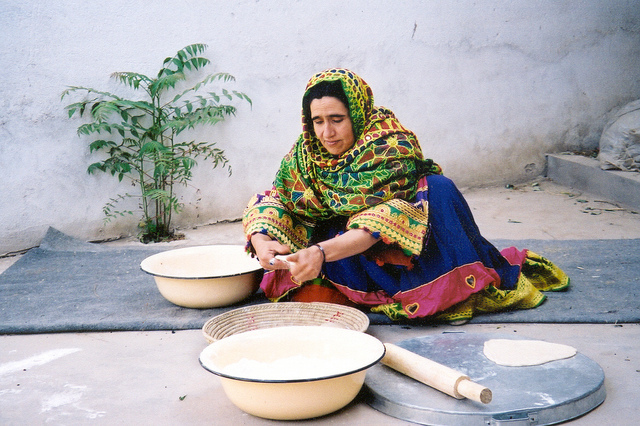Afghanistan
Three in five pre-school children in Afghanistan are stunted, the highest prevalence globally

Photo: Nigel Poole
COUNTRY CONTEXT
For centuries agriculture has been the mainstay of the predominantly rural Afghan society. Wheat is the principal food crop, while fruits and nuts and livestock products such as wool have played a large part in subsistence, in local marketed production, and in exports. A major food crisis in the early 2000s led to massive humanitarian intervention. The national rate of child malnutrition has reduced from a catastrophic level of more than 60% stunting recorded in 2003/04 to about 40% in 2011/12, but high levels of hunger and micronutrient deficiencies persist. Much attention is given in humanitarian work to therapeutic approaches to improving the nutrition of vulnerable groups, but the contribution of agricultural development and the food system to improving rural and urban diets also needs to be increased. The recent history and current context of Afghanistan point to other factors affecting the wellbeing of the population. Political fragmentation is enmeshed with military conflict, the drugs economy, cultural diversity, regional extremes of temperature and altitude, and migration. Research is needed in these complex conditions to improve the linkages between agriculture and nutrition, taking into account the conditions of political and environmental fragility and gender issues.
WHAT IS LANSA?
Leveraging Agriculture for Nutrition in South Asia (LANSA) is a programme of research which aims to generate evidence that can improve nutrition outcomes in India, Bangladesh, Pakistan and Afghanistan. The research under LANSA explores the fundamental, underlying and immediate determinants of nutrition particularly for women, girls and children under five years of age, and the ways in which the potential of agriculture to address malnutrition can be realised.
LANSA RESEARCH IN AFGHANISTAN
LANSA work in Afghanistan is led by the team from the LCIRAH, University of London. We are using national data to analyse the agricultural determinants of health and nutrition. Secondly, fieldwork is being undertaken through non-governmental organisations which have a permanent presence in Afghanistan. Thirdly, local research initiatives into agriculture and nutrition are being integrated into the programme. Finally, capacity building among local partner organizations is supported by the team from MSSRF, India and IDS, UK.
Read LANSA's approach to Influencing Target Policy and Practice in Afghanistan.







